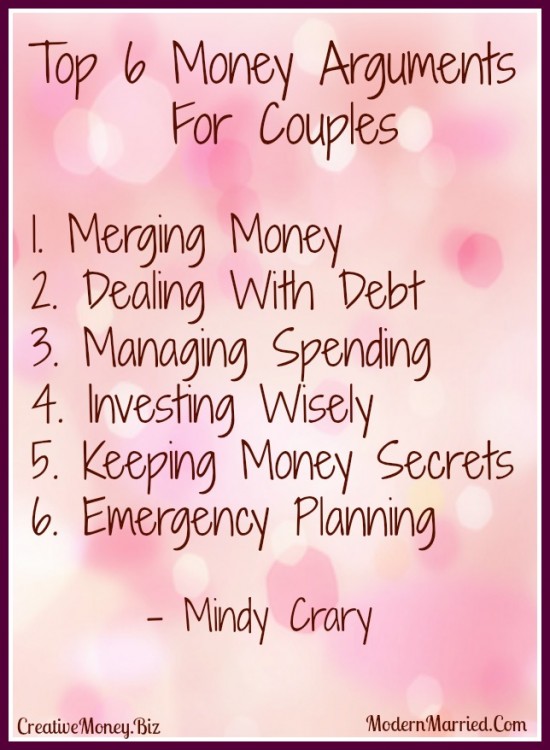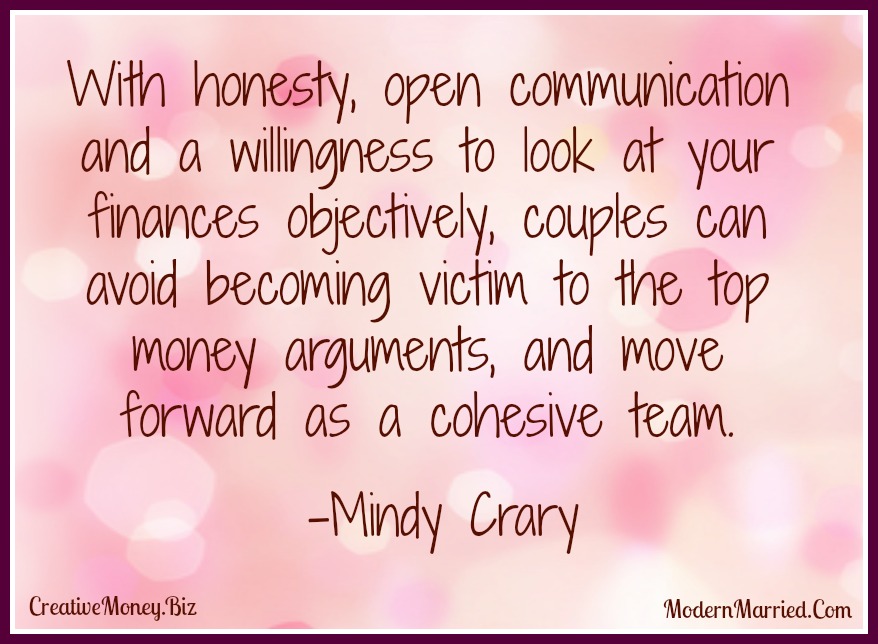 Oh Dear Readers, I am so delighted to share Expert Financial Coach, Mindy Crary’s brilliant, yet straightforward advice with you today.
Oh Dear Readers, I am so delighted to share Expert Financial Coach, Mindy Crary’s brilliant, yet straightforward advice with you today.
There are so many areas I am nowhere near an expert about and money is definitely one of them. Yet it is such a huge part of all of our marriages I knew I wanted to bring you practical, implementable advice so I set an intention, I asked the universe to send me the perfect person to share with the ModernMarried Family.
Two days later I received one of those email updates from Twitter saying I should follow Mindy Crary because 11 of my friends were following her already. I fell in instant Cyber-Love and invited her over. You can find a library of Mindy-Wisdom on her Creative Money Website here.
Without further ado, here are some great tips on how to move forward together without letting money get in the way!
By Mindy Crary
Confronting money issues for couples is pretty common relationship territory. If you and your partner are like most couples, chances are, you argue about money sometimes. Numerous studies have shown that money fights predict divorce rates. Based on a 2004 study by SmartMoney Magazine, here is what sparks the six most common types of arguments:
The Top Money Issues
Here are the top 6 things that couples typically fight about when discussing how to manage and organize their money:
Merging Money. Should you merge everything you have and earn into one joint account, or should you maintain individual accounts and open a joint one for household expenses? Couples run into trouble not necessarily when they are not in agreement—but when they start reading into what the lack of agreement means. There as many different ways to merge your finances as there are couples in the world, so don’t get caught up on how you believe things should happen. It took awhile to become a couple, and it will take a while to “couple” your cash as well.
Dealing With Debt. One of the worst things about coupling is feeling like you’re dragging down the relationship with debt—which can feel even worse if your partner comes into the union debt-free. Whenever debt enters the relationship, it’s good to remember that no one is infallible—the debt is not a way to keep a “scorecard” in the relationship. People in mature relationships accept that solving the debt as a team not only strengthens the relationship, but helps reduce the debt more quickly.
Managing Spending. In many relationships, one gets labeled the “saver” and the other gets labeled the “spender.” Labels and categories can do real injustice to an in-depth, multi-layered relationship, and they never serve to make you feel closer to your partner. And it may not even be true: traditionally, women usually take care of most of the family’s daily expenses: the groceries, the bills, clothes for the family, while men spend on large purchases like mortgages, cars payments or home equipment. The spending amounts to roughly the same, it just played out differently based on the person. They key here is to remember that you’re simply trying to avoid surprises, which a budget goes a long way toward fixing.
Investing Wisely. Over many years, various studies show that men are more willing to take financial risk than women. However, investments are a secondary argument. The biggest issue is achieving agreement and understanding of how specific buckets of money will be used in varying timeframe—or how I like to ask, “which money will be used for what–?” Once a discussion of goals and timeframes are clarified for different accounts and sums of money, it becomes much easier for couples to align themselves with common goals and objectives.
Keeping Money Secrets. Let’s face it; most of us have trouble not lying to ourselves, let alone other people. Lies about what we ate, what we spent . . . this is one of the fundamental challenges of a relationship, to be vulnerable and transparent in all areas (and not letting your own shame and money secrets degrade to such a point they damage you and the people around you!). If you knew that lying about how many books you downloaded on Kindle, even once, would lead to a less authentic, open relationship with your spouse, would you do it? Probably not. Each partner must keep in mind that most relationships aren’t destroyed by one dramatic act, but a series of small, even individually inconsequential acts that chip away at your foundation of love and trust.
Emergency Planning. Just like couples vary on the degree of risk they are willing to take, they also vary on the level of reserves they need to feel safe. The key here is to find the commonality; both partners typically agree that some level of cash reserves makes sense, so where is the middle ground? Once a budget is clarified, issues of emergency savings become secondary, since some level of savings has already been allocated within the spending plan. It helps to remember if there actually is an emergency, you’ll be distracted with supporting one another—and NOT worrying about how to spend the reserve!
Sometimes it’s hard to forgive money mistakes—yours, your partners—so the key is to get ahead of them before they happen! With honesty, open communication and a willingness to look at your finances objectively, couples can avoid becoming victim to the top money arguments, and move forward as a cohesive team.
Actions This Week
Review The List. I never look for agreement between couples, I just make sure that both parties have a viewpoint and understanding of each of the above issues. That’s the perfect starting point.
Look for Clarity. When I discuss controversial subjects with couples, they tend to think that they disagree on these topics, when actually–when they stop to listen to each other–the two viewpoints aren’t so dissimilar. Seek to understand your loved one before fighting to get your point across.
Go for Equity, not Equality. Equal means each person gets exactly the same thing. Equity means that each person might not be treated exactly the same, but that it all balances out in the end. A couple might not get exactly what they want in every single area of their finances, but you can still make it win-win with balance.
Mindy Crary (MBA, CFP® practitioner and financial coach at Creative Money) helps you become a lot more educated (never inundated) about not just your money — but the whackjob behind it. Mindy’s articles have been featured in Forbes, Crazy Sexy Wellness, Life By Me, Mind Body Green and Tiny Buddha. Go to Creative Money and download Mindy’s free ebook, Getting Started With Conscious Spending.
This is Maggie back to say a huge THANK YOU to Mindy for sharing this wise advice! I love, love, love the idea of Concious Spending! And also how there are a million and one ways to merge your money – so don’t believe it has to be the way your parents did it.
This week’s LoveWork is to identify the one thing that causes the most money-pain in your relationship. Name one thing you can do this week to start the path of changing that.
In the comments – please share any money questions you have or name one action step you can take this week to start solving a money problem.




